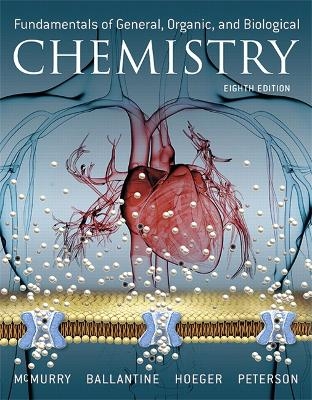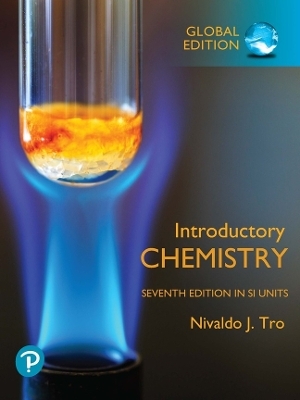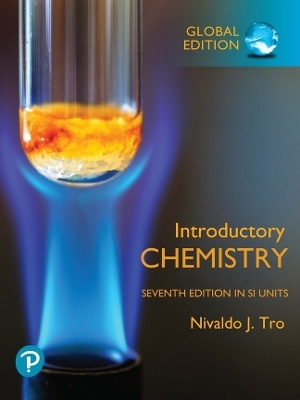
Fundamentals of General, Organic, and Biological Chemistry
Pearson (Hersteller)
978-0-13-521374-2 (ISBN)
- Titel z.Zt. nicht lieferbar
- Versandkostenfrei innerhalb Deutschlands
- Auch auf Rechnung
- Verfügbarkeit in der Filiale vor Ort prüfen
- Artikel merken
Pearson eText is an easy-to-use digital textbook that you can purchase on your own or instructors can assign for their course. The mobile app lets you keep on learning, no matter where your day takes you — even offline. You can also add highlights, bookmarks, and notes in your Pearson eText to study how you like.
NOTE: This ISBN is for the Pearson eText access card. Pearson eText is a fully digital delivery of Pearson content. Before purchasing, check that you have the correct ISBN. To register for and use Pearson eText, you may also need a course invite link, which your instructor will provide. Follow the instructions provided on the access card to learn more.
John McMurry, educated at Harvard and Columbia, has taught approximately 17,000 students in general and organic chemistry over a 30-year period. A Professor of Chemistry at Cornell University since 1980, Dr. McMurry previously spent 13 years on the faculty at the University of California at Santa Cruz. David S. Ballantine received his B.S. in Chemistry in 1977 from the College of William and Mary in Williamsburg, VA, and his Ph.D. in Chemistry in 1983 from the University of Maryland at College Park. After several years as a researcher at the Naval Research Labs in Washington, DC, he joined the faculty in the Department of Chemistry and Biochemistry of Northern Illinois University, where he has been a professor since 1989. Carl Hoeger received his B.S. in Chemistry from San Diego State University and his Ph.D. in Organic Chemistry from the University of Wisconsin, Madison in 1983. After a postdoctoral stint at the University of California, Riverside, he joined the Peptide Biology Laboratory at the Salk Institute in 1985 where he ran the NIH Peptide Facility while doing basic research in the development of peptide agonists and antagonists. During this time he also taught general, organic, and biochemistry at San Diego City College, Palomar College, and Miramar College. He joined the teaching faculty at University of California, San Diego in 1998. Dr. Hoeger has been teaching chemistry to undergraduates for over 20 years, where he continues to explore the use of technology in the classroom; his current project involves the use of video podcasts as adjuncts to live lectures. Virginia Peterson received her B.S. in Chemistry in 1967 from the University of Washington in Seattle, and her Ph.D. in Biochemistry in 1980 from the University of Maryland at College Park. Between her undergraduate and graduate years she worked in lipid, diabetes, and heart disease research at Stanford University. Following her Ph.D. she took a position in the Biochemistry Department at the University of Missouri in Columbia and is now Professor Emerita. When she retired in2011 she had been the Director of Undergraduate Advising for the department for 8 years and had taught both senior capstone classes and biochemistry classes for non-science majors. Although retired, Dr. Peterson continues to advise undergraduates and teach classes.
1. Matter and Measurements
2. Atoms and the Periodic Table
3. Ionic Compounds
4. Molecular Compounds
5. Classification and Balancing of Chemical Reactions
6. Chemical Reactions: Mole and Mass Relationships
7. Chemical Reactions: Energy, Rates, and Equilibrium
8. Gases, Liquids, and Solids
9. Solutions
10. Acids and Bases
11. Nuclear Chemistry
12. Introduction to Organic Chemistry: Alkanes
13. Alkenes, Alkynes, and Aromatic Compounds
14. Some Compounds with Oxygen, Sulfur, or a Halogen
15. Amines
16. Aldehydes and Ketones
17. Carboxylic Acids and their Derivatives
18. Amino Acids and Proteins
19. Enzymes and Vitamins
20. Carbohydrates
21. The Generation of Biochemical Energy
22. Carbohydrate Metabolism
23. Lipids
24. Lipid Metabolism
25. Protein and Amino Acid Metabolism
26. Nucleic Acids and Protein Synthesis
27. Genomics
28. Chemical Messengers: Hormones, Neurotransmitters, and Drugs
29. Body Fluids
| Erscheint lt. Verlag | 8.8.2018 |
|---|---|
| Sprache | englisch |
| Maße | 201 x 251 mm |
| Gewicht | 46 g |
| Themenwelt | Naturwissenschaften ► Chemie |
| ISBN-10 | 0-13-521374-6 / 0135213746 |
| ISBN-13 | 978-0-13-521374-2 / 9780135213742 |
| Zustand | Neuware |
| Informationen gemäß Produktsicherheitsverordnung (GPSR) | |
| Haben Sie eine Frage zum Produkt? |
aus dem Bereich


